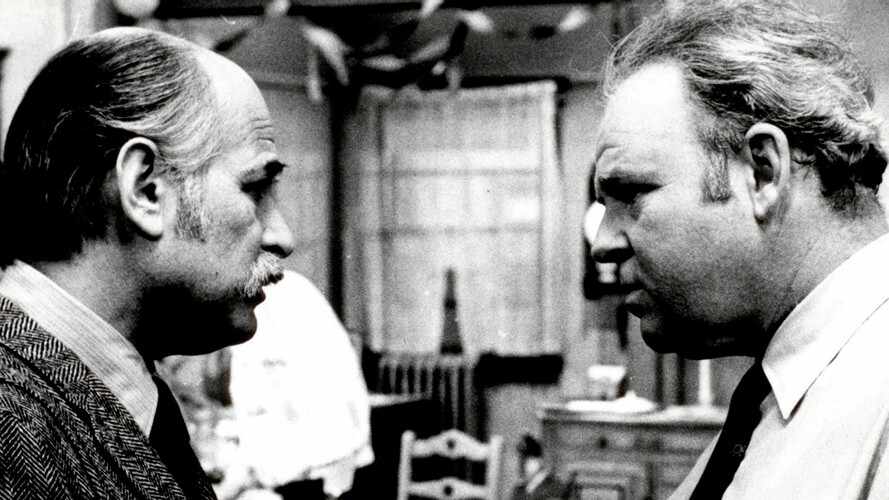In 2018, I sang “Happy Birthday” to Norman Lear, on the day he turned 96.
I wasn’t alone, of course. Lear had just appeared at a press conference for the 2017-20 revival of “One Day at a Time,” and members of the Television Critics Association donned porkpie hats similar to the one he seemed to always wear and sang to the TV legend — which is not the sort of thing we usually do.
But this was TV legend Norman Lear! I’d been a fan since I was a kid. Well, I’d recognized his name in the credits since I was 10 as I watched “All In the Family,” “Maude,” “Sanford and Son,” “Mary Hartman, Mary Hartman,” “Good Times,” “The Jeffersons,” “One Day at a Time,” “Diff’rent Strokes,” “The Facts of Life” — just to name a few.
Later, I realized that his credits included TV shows that shaped the medium well before I was born, including variety shows headlined by Dean Martin and Jerry Lewis, Martha Raye, Danny Kaye, Andy Williams and many more.

| courtesy Sundance Institute Norman Lear (left) and Carroll O'Connor on the set of "All in the Family," in an image from the documentary "Norman Lear: Just Another Version of You." The film will play in the Documentary Premieres section of the 2016 Sundance Film Festival, and is one of the Day One opening-night selections.
Lear died Tuesday at age 101, and he worked most of his long life. His contributions to television cannot be overstated. His wildly successful sitcoms changed the medium.
At a time when TV was populated by pleasant pablum like “The Beverly Hillbillies,” “Mayberry R.F.D.” and “The Brady Bunch,” here came loud, racist, often ignorant Archie Bunker and his loud, liberal, unyielding son-in-law, Mike Stivic, in “All In the Family,” injecting politics and social issues that had previously been taboo.
(As a child, I thought Mike was always right and Archie was always wrong. When I rewatched “All In the Family” as an adult, I realized they were both right sometimes and wrong sometimes.)
What Lear did on TV was amazing. So was what he did off TV — at the height of his television success, he founded People for the American Way, a progressive advocacy group specifically designed to battle the Moral Majority and its right-wing agenda.
If you look Lear up online, you’ll see that he’s almost always described as a liberal. But in 2016, he told TCA members that wasn’t true.
“Everybody knows me to be a progressive or a liberal or lefty or whatever. I think of myself, by the way, as a bleeding-heart conservative,” he said while promoting an “American Masters” profile of him shortly before it aired on PBS. “You will not [expletive] with my Bill of Rights, my Constitution, my guarantees of political justice for all.”
And, he said, his heart bled “for those who need help and aren’t getting the justice that the country promises them and the equal opportunity the country promises. … I’m a bleeding heart, but I think myself to be a total social conservative.”
Archie Bunker, who he based partly on his own father, and other conservative characters on his many shows weren’t always wrong. And the liberals weren’t alway right.
In his later years, Lear often said that “All In the Family” couldn’t make it on the air in the current climate, because corporate TV executives were too afraid of shows that dealt with politics, race and social issues. Certainly not in the brash, bold way he championed. No doubt because those TV execs are afraid of being branded somehow un-American by the right or the left.
Lear never worried about that.
“If you follow me clearly, you’ll find me critical of my country a lot. And if you follow me even more clearly, you’ll find out how much I love my country,” he said. “And it’s because I love it that I take the moment, the time, the thought to deal with it when I think it’s wrong.”
Certainly, Lear himself wasn’t alway right, even though he absolutely came across like he thought he was. And I don’t say that just because, back when I was president of TCA, he scolded me once.
At that 2016 TCA press tour, Lear was clearly nonplussed when critics didn’t applaud when he took the stage. When he said something supportive of PBS, he even said, “Now, that earns a little applause. Not a lot, just a little.” There was a smattering of applause — mostly from PBS personnel — and Lear said, “I certainly got my wish, not a lot. Who are you people?”
He had an ego. His long list of credits and work to better America entitled him to that. But, don’t get me wrong, he wasn’t egotistic. Asked if there was anything he would’ve done differently with his shows, Lear replied, “There’s probably nothing I did that I wouldn’t wish to have done better.”
He raised the issue of applause again as we chatted after the session. I explained that TCA members are journalists, not fans, and journalists don’t applaud. I pointed out that reporters don’t clap when the president of the United States appears before them.
I don’t think he liked that answer, but he kept talking to me. Because he didn’t turn his back on people with whom he disagreed — he was willing to engage.
There’s not enough of that in America today.




